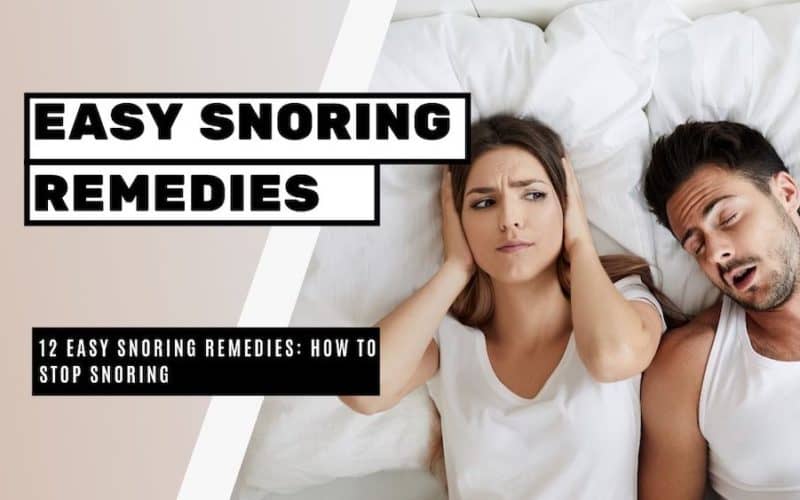Snoring is a common problem that can affect both qualities of sleep and health and relationship. It is estimated that half of all adults sometimes snore and 10-20 percent do so regularly. Fortunately, there are snoring remedies that can alleviate various types of snoring. So, let’s look at the thirteen remedies to stop snoring.
Table of Contents
- Why do People Snore?
- Remedies to Stop Snoring:
- 1. Lose weight
- 2. Avoid alcohol
- 3. Avoid sleeping pills
- 4. Quit smoking
- 5. Sleep on your side
- 6. Prop up head end / orthopedic pillow
- 7. Treat nasal allergies and congestion
- 8. Throat and tongue exercises
- 9. Keep your bedroom air moist and fresh
- 10. Oral mouthpieces/ appliances
- 11. Singing
- 12. Playing the didgeridoo
- 13. Medical and Surgical Treatment for Snoring
Why do People Snore?
It is important to know the reason for the snoring before trying any kind of snoring remedies.
Generally, we think of a fat older man when coming up with snoring, but as a matter of fact, a study has shown that people of all ages snore, and it is as much common as 50% of the population in certain areas (1).
According to Lynn A. D’Andrea, a sleep specialist at the University of Michigan Medical School; snoring is the sound produced by vibrating structures of the upper airway, typically during inhalation (2). But, there are some other reasons for the snoring. Some are listed below:
- Mouth anatomy: According to a study, thick and enlarged uvula (part of your palate) can obstruct your mouth during sleep and cause vibrations (3). Similarly, infection of tonsils can also obstruct the airway.
- Nose problems: Nose congestion or a deviated septum may be one of the causes of turbulence in the airflow, which produces snoring.
- Alcohol consumption: Drinking too much alcohol, relaxes your throat muscles that can cause snoring while sleeping.
- Being overweight and obese: They have extra tissues in the back of the throat, which narrow the airway.
- Sleep position: Snoring is loudest and most frequent while sleeping on back due to the effect of gravity narrowing the airway.
- Sleep deprivation: Not getting enough sleep further relaxes your throat.
- Obstructive sleep apnea: A medical disease in which the airway gets obstructed repeatedly during sleep.
Remedies to Stop Snoring:
The basic concept of all methods is to avoid discomfort during breathing and relieve any obstruction of airways. As medicines are usually not helpful in treating the symptoms of snoring, doctors recommend lifestyle measures as the first line of treatment as they are most effective in long term control.
1. Lose weight
Research seems to suggest that weight loss can, indeed, improve snoring (3). Overweight individuals are more likely to snore because they have more fatty tissue and poor muscular tone around their neck, which causes obstruction during sleep.
Regular exercise and a healthy diet plan are the best ways to lose weight. It will also improve your general health and quality of life. If you are overweight and snoring then losing weight is the only way to stop snoring naturally.
2. Avoid alcohol
Another remedy to stop snoring naturally is that avoid drinking alcohol, especially before bedtime. According to a study, alcohol before sleep causes your muscles to relax and vibrate more (4). Relaxed muscles of throat obstruct respiration and cause turbulence, which produces snoring.
3. Avoid sleeping pills
Try to avoid sleeping and sedative drugs as much as possible because they relax your muscles and make you snore more. If you need to take, use a reasonable limit according to the advice of your doctor. You can practice alternative exercises and habits to help you sleep instead of remaining dependent on sleeping pills.
4. Quit smoking
A study has shown that smoking raises the risk of snoring (5). Smoking irritates your airway and makes snoring even worse. The chemicals and hot smoke cause inflammation of your throat, and they swell up. Quitting smoking can be beneficial not only to stop snoring naturally but also for your health in general.
5. Sleep on your side
Due to the effect of gravity, sleeping on your back causes narrowing of your throat airway as your jaw and throat muscles to fall back. Make a habit of sleeping on your side to avoid obstructing the airflow.
So, if the snorer is gently to roll onto his or her side, the tissues no longer cause any obstruction and the snoring decreases. This sleeping technique will stop snoring immediately.
6. Prop up head end / orthopedic pillow
Elevating your head end can be helpful to keep your airway open and to reduce or eliminating the snoring. Use an additional pillow or specially designed orthopedic pillow are available, which are specially designed to ensure your jaws stay open and prevent obstruction of airflow.
These orthopedic pillows are very convenient to use and probably the least interrupting trick among all to reduce snoring effectively.
7. Treat nasal allergies and congestion
Congested nose and chronic nasal allergies can be a cause of snoring. If you have some sort of seasonal allergies or flu, consult your doctor and use decongestants or nasal steroid sprays.
These medicines will promptly help open your nose and airways to allow uninterrupted airflow through nose and mouth. However, these medicines must not be used for a long duration.
8. Throat and tongue exercises
In some cases where the cause is weak muscles of tongue and throat, specific exercises that involve curling the tongue repeatedly and pronouncing some vowel sounds have been proven beneficial. Seek professional help to learn throat and tongue exercises to stop snoring.
9. Keep your bedroom air moist and fresh
The membranes of the throat and nose get irritated with dry and polluted air. Keep your bedroom ventilated with fresh and moist air. It is a simple measure that will soothe your respiratory air passage and give you comfort.
10. Oral mouthpieces/ appliances
These are dental appliances that fit In the mouth. They push the jaw and tongue forward to improve airflow. A study showed these oral appliances are effective in reducing both nonsevere and severe forms of snoring (6).
You have to get an appointment for a dentist who will prepare a device for your size. Nasal dilators and stripes are also available for narrowed or blocked airways. They are made to keep the nose open while sleeping.
11. Singing
It improves the strength and tone of muscles of soft palate and throat. A research study showed that there was a reduction in the loudness, frequency, and severity of snoring by daily singing exercise for three months by the participants (7).
12. Playing the didgeridoo
Didgeridoo is a musical instrument from Australia, which has been shown effective in moderate snoring. In a randomized control trial study, there was a decrease in daytime sleepiness and snoring by the regular playing of a didgeridoo by the participants (8).
13. Medical and Surgical Treatment for Snoring
- Continuous positive airway pressure (CPAP): CPAP is a machine that is often used to control sleep apnea and the snoring associated with it. It is a relatively safe medical treatment. A device pumps a pressurized stream of air through a flexible hose to a mask worn over the nose and mouth. The air pressure delivered through this is required to keep the airway open. CPAP machine is attached to it, which works as an air compressor. It is not so popular among people who snore.
- Surgical treatments for snoring: If you have tried all other options and it is not getting any better, don’t lose hope. Surgery is an option that is aimed at reducing obstruction or narrowing in the anatomic area, which is causing the snoring. It may not treat the snoring entirely but certainly decrease it. In these procedures, uvula, and part of your soft palate is removed.
- Uvulopalatopharyngoplasty (UPPP): This is a surgical technique that is used when the soft tissue in the mouth is responsible for causing the snoring. The surgeons increase the size of nasal passage by removing the uvula, eliminating some excess tissue in the throat, and shortening the soft palate.
- Laser-assisted uvulopalatoplasty (LAUP): An surgery in which there is the removal of the uvula and shortening of the soft palate by use of a hand-held laser beam.
- Radiofrequency palatoplasty: In this procedure, the surgeon shrinks and stiffens the soft palate and uvula by using a low-intensity radiofrequency so that they are less likely to vibrate.
- Tonsillectomy and adenoidectomy: If enlarged tonsils and adenoids are obstructing the nasal passage during sleep, then these procedures are used.
- Nasal septoplasty: This surgical procedure resizes and straightens the bone and tissues that are identified as nasal deformities.
Lifestyle modifications and simple remedies are first-line treatment recommended by health professionals for snoring. They are easy to use and have excellent results. The majority of symptoms of snoring will go away by using these remedies to stop snoring.
In addition to this, some medical and surgical options also available but applicable to specific conditions only. You should know what potential disease conditions can be associated with it. Adopt healthy habits, and enjoy your life.





